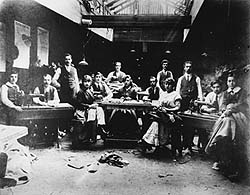-
They evinced no concern for the cleanliness of the area they lived in.… [T]he streets [were] filthy and stank to the skies.…They were considered to be swindlers, prone to lying. “An Arab never speaks the truth, except by mistake,” said policemen who served in the area.
 That’s a description of London’s Jewish neighborhood, the East End, in 1904. I’ve quoted from Anita Shapira’s Brenner: A Life, her fascinating new biography (in Hebrew) of Zionist literary lion Yosef Haim Brenner—except that I’ve replaced the word “Jew” with “Arab.”
That’s a description of London’s Jewish neighborhood, the East End, in 1904. I’ve quoted from Anita Shapira’s Brenner: A Life, her fascinating new biography (in Hebrew) of Zionist literary lion Yosef Haim Brenner—except that I’ve replaced the word “Jew” with “Arab.”
Lack of concern for the cleanliness and esthetics of public spaces and untruthfulness are the most common negative traits attributed by Jews to Arabs in Israel. These stereotypes cross all social and political boundaries—I’ve heard them from working-class Israelis in impoverished neighborhoods and from professors at universities, from religious champions of Greater Israel and from peace activists. When I’ve dared to suggest that these characteristics might not be inherent in the Arab character, I am generally silenced with what they see as the irrefutable argument: “You don’t know the Arabs the way I know the Arabs.”





